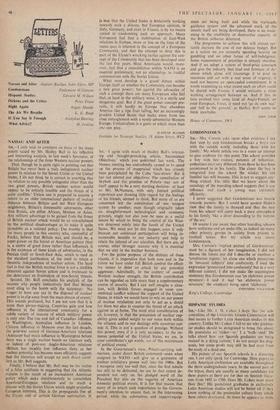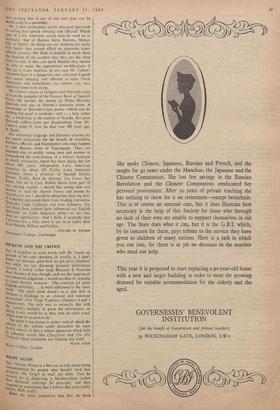Sm,—Like, Mr. J. NI. Cohen 1 hope that the sub-
committee of the University Grants Commission will find means to further Latin American studies in this country. Unlike Mr. Cohen I fail to see why peninsu- lar studies should be denigrated to bring this about. He postulates an 'either—or,' I a `both—and: Be talks about how our Spanish graduates arc being trained in a dying culture; I do not accept his diag- nosis, but some profit may still be had even from the study of a dead one.
His picture of our Spanish schools is a distorting one. I can only speak for Cambridge. Here papers in Latin American civilisation are available throughout the three undergraduate years. In the second part of the tripos, there are usually as many candidates for these papers as there are for that on Spanish litera- ture from 1492 to 1700. Does Mr. Cohen want more than this? His postulated graduates in exclusively Latin American studies will not be better off if they know nothing of the peninsular culture from which these others developed. At times he appears to think
that nothing that is not of our own time can be worth study in a university.
Mr. Cohen deliberately insults educated Spaniards by calling their speech 'mincing' and 'affected.' Which type of Latin American accent does he want us to inculcate: that of Buenos Aires, Havana, Mexico City or Quito? As things are our students can easily visit Spain; they cannot afford an expensive trans- atlantic journey. We think it sensible to teach them the Spanish of the country that they are the most likely to visit. If they can speak fluently they should be able to make the appropriate modifications if they go to Latin America. In any case Mr. Cohen's argument here is a dangerous one: educated English may sound 'mincing' and 'affected to some North Americans and Australians; our culture, too, may appear to some to be dying.
Mr. Cohen's sneers at GOngora and Quevedo come ill from the compiler of the Penguin Book of Spanish Verse. He praises the poems of Pablo Neruda; Quevedo was one of Neruda's favourite poets. A knowledge of Quevedo' S best poems—which can do nothing but good to anybody—will 1 a help rather tha a hindrance to the student of Neruda, But poor Quevedo suffers from one disadvantage from Mr. Cohen's point of view; he died over 300 years ago, in Spain.
Our university language and literature courses are not meant exclusively for the benefit of travellers, teachers, officials, and businessmen who may happen t° visit Buenos Aires or Tegucigalpa. They are intended also to enable young men and women to comprehend the contribution of a literary tradition to world civilisation., Spain has been doing this for about 900 years: independent Latin American countries for about 150. Earlier Latin American literature forms a province of Spanish literary historY. Ercilla, Ruiz de AlarcOn, Las Casas, Sor Juana Inds de la Cruz, Ruben Dario form .part- of our existing courses. I should like young men and women to read the Martin Fierro and poems by Neruda too; but I should be doing less than my duty I f I thereby prevented them from reading Cervantes, Quevedo, Lope, Calderon and even GLingora. For 9.0e thine these authors have influenced our English literature; no Latin American writer—so far—has done so, significantly. And I think it probable that ,Uervantes has a little more to say to us today than nave Neruda, Pellicer and Vallejo.
EDWARD M. WILSON































 Previous page
Previous page